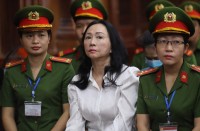MANILA, Mar. 30 — Labor and Employment Secretary Rosalinda Dimapilis-Baldoz recently said that the increased number of Filipino candidate nurses and caregivers who could be deployed under the Japan-Philippines Economic Partnership Agreement (JPEPA) shows there is a continuing demand in Japan for health workers from the Philippines.
“The high number of Filipino candidate caregivers and nurses for the eighth batch under the JPEPA program is the biggest batch since its beginning in 2009,” Baldoz said. “This shows that there is an increasing demand for Filipino health workers in Japan.”
The eighth batch of candidates under the JPEPA is composed of 340 Filipino health workers, 63 of whom are nurses and 277 are caregivers.
Currently, a total of 398 vacancies, of which 77 are for nurses and 321 are for caregivers.
The health worker candidates are currently undergoing the Preparatory Japanese Language Training which started in November 2015 and will end on May 2016. After the PJLT, the candidate nurses and caregivers will depart for Japan in June 2016 to undergo another six months of Japanese language training.
Once the health worker candidates pass the language training, they can already undertake on-the-job training at the 210 nurse and 392 careworker facilities – a total of 602 – facilities in Japan.
Baldoz said that in 2015, a total of 293 workers – 75 nurses and 218 caregivers – were deployed to Japan under the JPEPA program, the biggest deployment thus far. Since 2009 a total of 1, 265 health workers – 413 nurses and 852 caregivers – were deployed under the program.
The Commission on Higher Education has also deployed 37 healthcare workers in two batches under the program’s school track.
The JPEPA, signed between the Philippines and Japan on 9 September 2009 in Helsinki, Finland, seeks to improve the trade relations between the two countries.
The JPEPA is seen as a building block to the ASEAN-Japan Free Trade Agreement and covers wider scope that includes trade in services, movement of natural persons, and technical cooperation and assistance.
Other than nurses and caregivers, the JPEPA, under its chapter on the movement of natural persons, also include other professionals with specialized skills, such as lawyers, accountants, taxation consultants, and engineers. (DOLE)







